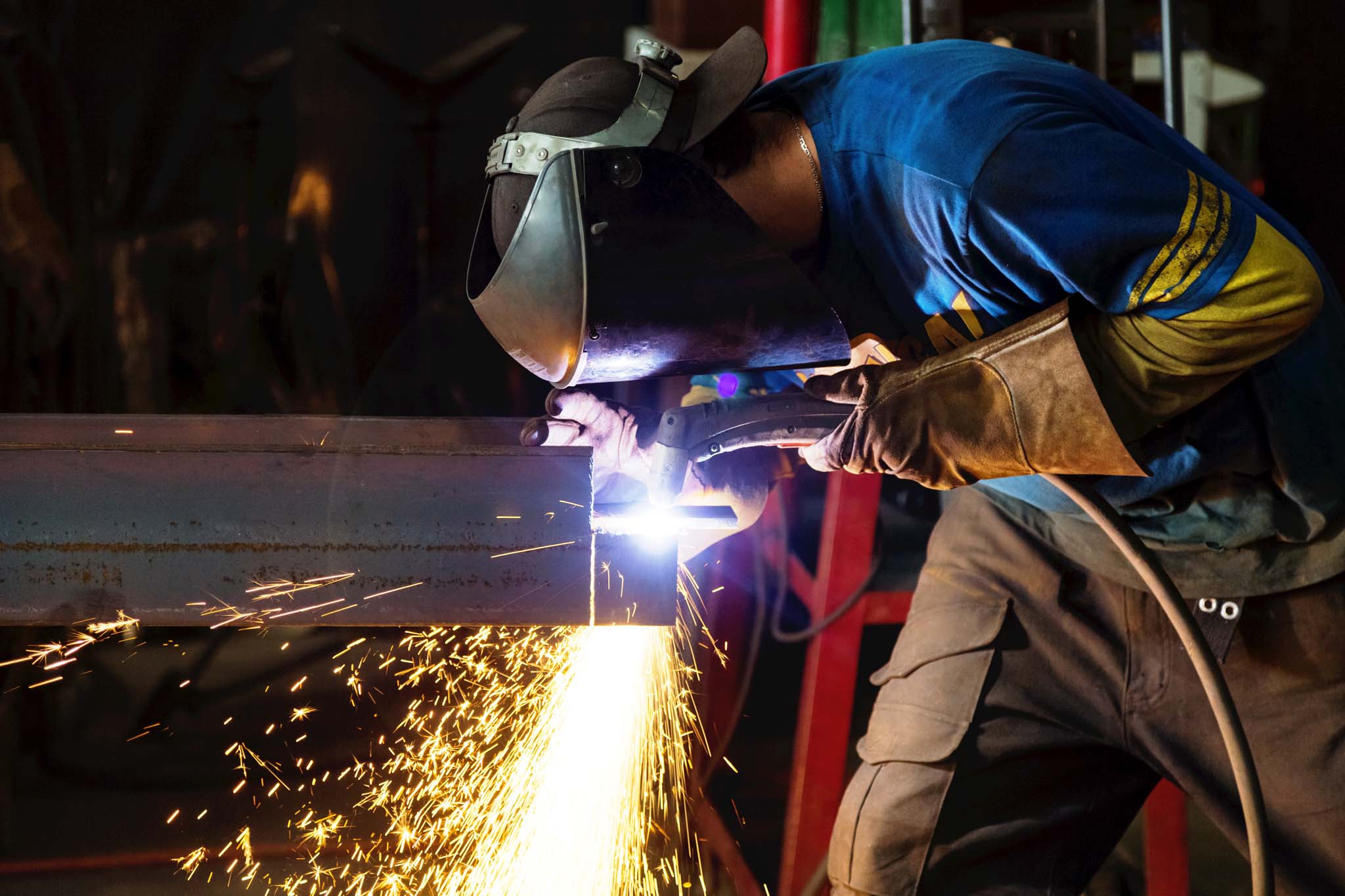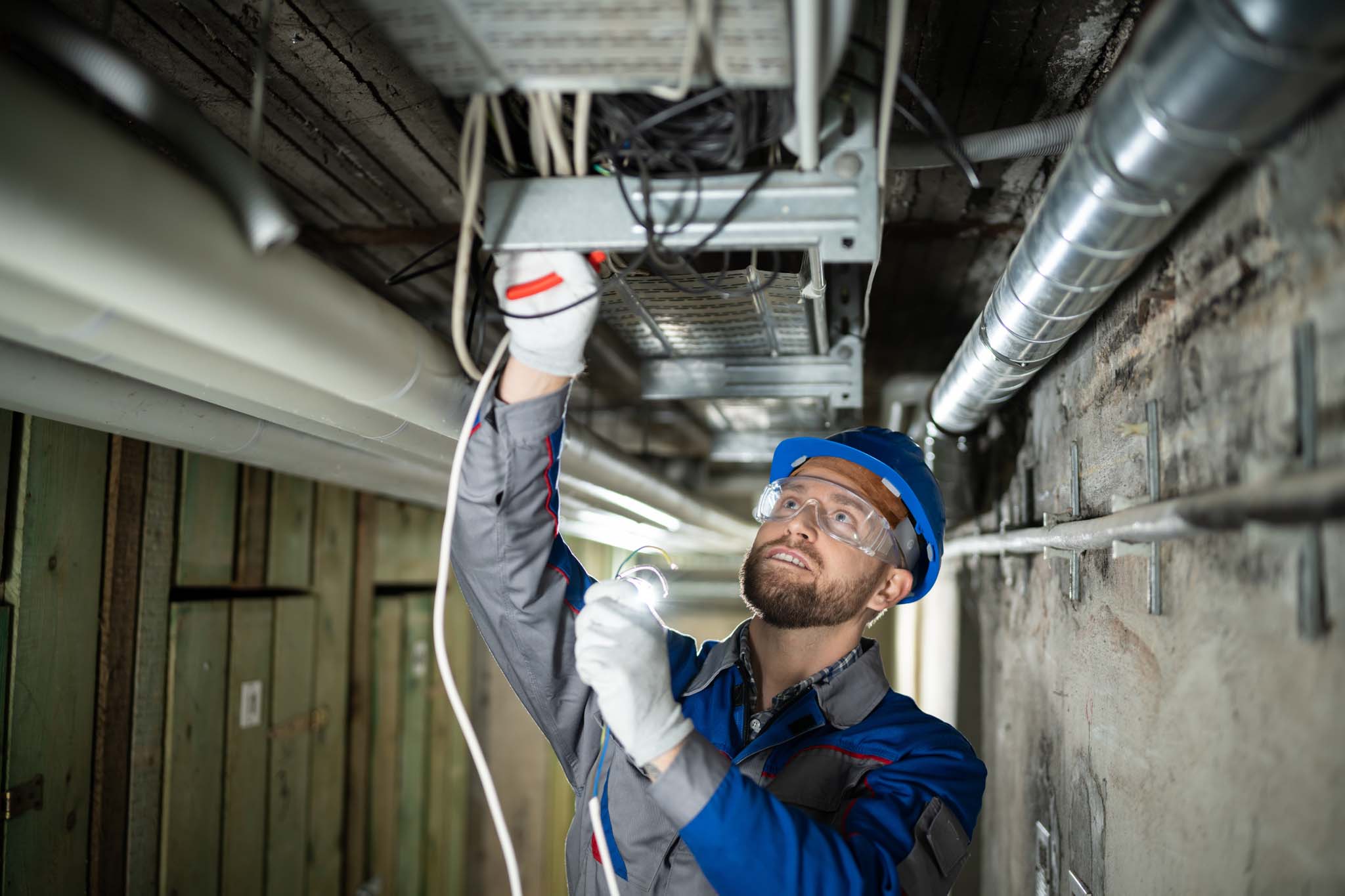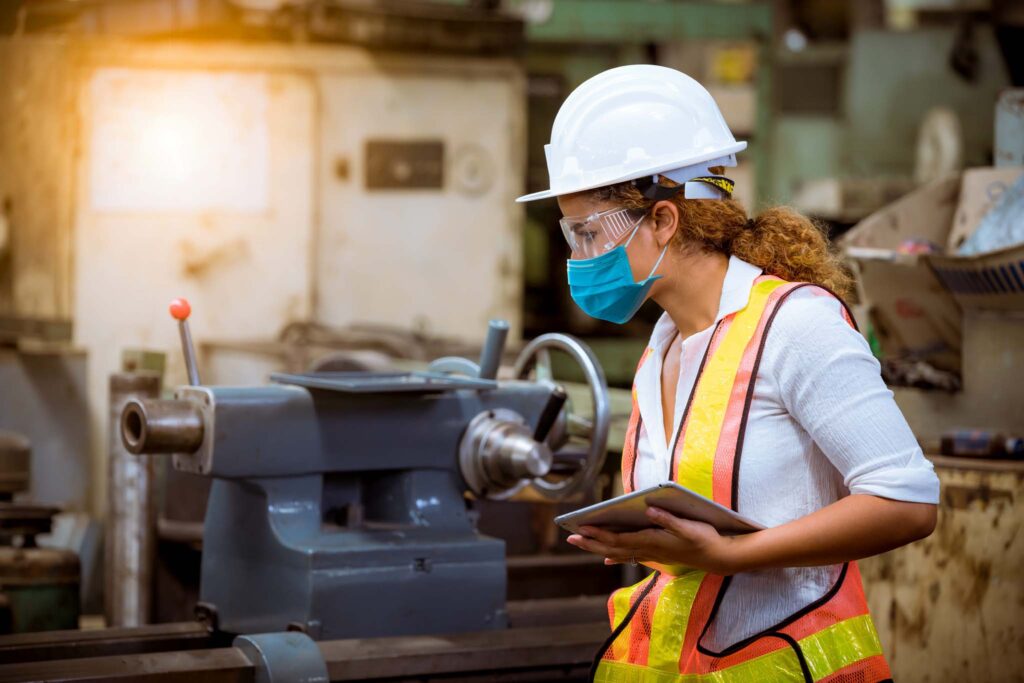What are the Skilled Trades?
Did you know that there are more than 140 skilled trades professions, all with exciting opportunities to help you grow a long and rewarding career? From chef to electrician to programmer, there’s a skilled trade for everyone. Keep scrolling to find your perfect match.



Filter by:
Construction
Ontario’s towns and cities are growing. This means construction is growing, and so are the job prospects.
Architectural Glass and Metal Technician
This is a job where people can see and pass by your work, literally. Not only does an Architectural Glass and Metal Technician offer you a foot in the door into an exciting career, but this job works on the walls and windows of commercial and residential buildings, and cars. You will install storefront frames and entrances, doors, skylights, and curtain walls. You are handling, measuring, cutting, preparing, fitting, installing, replacing and repairing all types of glass and glass substitutes.
Think about a building or an apartment that was exciting to look at. An Architectural Glass and Metal Technician made it happen. Not only will you improve the look of the buildings, but you will also be responsible for the durability and energy efficiency of its windows and panels. And you’ll be working with cranes.
Boilermaker
If you can handle the heat, get out of the kitchen and into a boiler room. As a Construction Boilermaker, you’ll build, install, test, maintain, and repair all kinds of boilers, tanks, and pressure vessels. You’ll be responsible for making sure boiler systems aren’t leaking, defected, and are operating safely and efficiently. You get to work with your hands and heavy machinery, like using punch presses and big cutters to create steel materials before hoisting them into place. This job can get sweaty and dusty, but it’s necessary for all kinds of buildings.
Brick and Stone Mason
Brick and Stone Masons are foundational to industrial, commercial, institutional, and residential buildings.
You’ll work with stones, but you will also have bricks, tiles, concrete blocks, panels, insulation, and more. All of it will come in handy, as this job will involve installing, maintaining, repairing, and altering all kinds of surfaces. You’ll be working on walls, floors, arches, pavings, partitions, fireplaces, chimneys, smokestacks, and other structures. You’ll also cut stones, which means you’ll use some intense power tools.
Cement (Concrete) Finisher
Here’s a concrete fact: the world always needs cement, so employment in this line of work is cemented. We apologize for setting a pun but working as a Cement (Concrete) Finisher is a great career in construction. You’ll work in all types of residential, institutional, commercial, and industrial buildings.
This job involves preparing, forming, reinforcing, placing, leveling, finishing, curing, and jointing all types of concrete flatwork. You’ll apply a variety of construction methods to produce a wide range of finishes, colours, and textures to buildings.
Concrete Pump Operator
Concrete can get heavy, so someone has to be in charge of getting it to and from the places where it’s needed most. That’s where a Concrete Pump Operator comes in handy to seal the fate of a construction project. You’ll deal with concrete pumps that are truck-mounted, trailer-mounted, stationary, or on tower concrete placing booms.
On the job, you’ll coordinate the placement of concrete at work sites, operate high-pressure pumps, perform pre-operational inspections, monitor equipment performance, and understand government legislation, site plans, and manufacturers’ manuals. And sometimes, you get to communicate with your coworkers with hand signals.
Construction Craft Worker
Are you crafty enough to be a Construction Craft Worker? Good, because you’ll be working on a wide range of structures, from industrial and commercial sites to hydroelectric dams, roadways, bridges, tunnels, mining, and railways. You might also work on utility, landscape, and pipeline projects.
You’ll handle materials and are responsible for site security. You’ll operate equipment and could specialize in using off-road vehicles, drilling and blasting, scaling, sandblasting, high-pressure washing, diving, tunnelling, and performing emergency rescue. And you could do demolition, excavation, and compaction.
Construction Millwright
There is no construction without machinery and equipment, and a Construction Millwright is behind it all. You will lay out and install machinery, mechanical equipment, and other automated and robotic systems. If you consider yourself a people person, this job will have you working closely with people in other trades, like instrument mechanics, ironworkers, pipefitters, and electricians.
Specifically, on the job, you’ll do mathematical calculations to interpret drawings and turn them into a finished product. You’ll use welds, brazes, solders, rigs, hoists, and hand and power tools. You will also install bearings, seals and packing, pipe systems and valves, fans and blowers, electric and electronic controls, and pneumatic and hydraulic systems. The major perk of this job is you will drive forklifts.
Drywall Finisher and Plasterer
If you like walls, someone with a noisy neighbour will appreciate your work. As a Drywall Finisher and Plasterer, you will maintain and restore interior and exterior walls, ceilings, and other building partitions to make them more decorative, more fire-rated, and yes, more soundproof. You will also texture concrete, apply plaster to foundation materials and fill in gaps and imperfections, and repair and restore ornaments.
Drywall, Acoustic and Lathing Applicator
Walls do more than protect the privacy of those within them—they also keep us warm, and safe from fires, and enhance the quality of sound in a room. As a Drywall, Acoustic and Lathing Applicator, you’ll be responsible for all of these, especially by taking a job from blueprint to finished rooms and buildings.
On the job, you’ll apply thermal insulation, sound insulation, and fire stopping. You’ll work on both walls, floors, and ceiling systems. You’re in charge of systematically diagnosing faults in electrical and electronic components. You may be building walls, but career opportunities won’t be walled off from you.
Electrician – Construction and Maintenance
Looking for a job with a jolt of excitement? As an Electrician – Construction and Maintenance, you will plan, assemble, connect, install, repair, test, inspect, and maintain electrical systems in residential, commercial, and industrial settings. This will include heating, lighting, power, communication, control, energy storage, renewable energy, and security systems.
You plan and execute on the job. You take blueprints, sketches, and specifications, and turn them into installed and tested electrical systems. You measure, cut, thread, bend, assemble, and install conduits and conductors. And after a long day’s work, you’ll leave the site with an electric feeling of powering neighbourhoods and cities.
Electrician – Domestic and Rural
Enjoy having a mix of city, suburban, and rural life? An Electrician – Domestic and Rural will plan, assemble, connect, install, repair, test, and maintain electrical systems, specifically in houses, small dwellings, and/or farms. These systems include heating, lighting, digital, communication, control, and security systems.
You will be a master interpreter of blueprints, sketches, and specifications, taking a system from early concept to electrical connection. You will have an eye for detail, by testing equipment and diagnosing faults in electrical and electronic components. This is a job that will be a conductor of excitement.
Exterior Insulated Finish Systems Mechanic
It is possible for a building to be durable and delightful to look at, and that’s thanks to an Exterior Insulated Finish Systems Mechanic. This profession made stucco cool again, but now this added layer protects buildings from moisture and fire, improves its thermal performance, and bolsters its acoustics. You are, quite literally, a building’s outer layer of defence against the elements.
Floor Covering Installer
A floor can tie a room together, and as a Floor Covering Installer, you will be responsible for setting the tone of each room in a house or commercial building. You will install, repair, and replace floor coverings. You’ll have a wide range of surfaces at your disposal, including under cushion, carpeting, vinyl, tile, pre-finished and unfinished wood, laminate, and artificial turf.
Part designer, part builder, you will prepare floors, verify plans, and install surfaces. Your impact will be felt by everyone who steps into your rooms.
General Carpenter
The General Carpenter of today does a lot more than woodworking. They also construct, renovate, and repair structures made of steel, concrete, and other materials. You will build door and window systems, stairs, posts, and handrails. You will also install concrete foundations and frame floors, walls, ceilings, and roofs.
From the get-go, you establish building plans and prepare worksites. Your work will come in the form of houses, condos, stores, and skyscrapers. You are making an impact from the ground, up.
Hazardous Materials Worker
If you’re into making harmful areas safer, this job is perfect for people who don’t get goosebumps at the first sight of danger. As a Hazardous Materials Worker, you will identify, remove, package, transport, and dispose of materials that are harmful to people and the environment, like lead, mercury, and other biological hazards.
On the job, you will enclose job sites, pre-clean them, remove and clean materials, and perform routine inspections. You’ll set up decontamination chambers and waste chutes. Formal wear for this job is a Hazmat suit and a gas mask.
Heat and Frost Insulator
As a Heat and Frost Insulator, you could think of yourself as giving houses and buildings the perfect coat to withstand every season. You will work with insulating material to prevent or reduce the flow of heat, cold, vapour, moisture, sound, or fire. These materials will be used on systems, equipment, walls, floors, and ceilings. Your job will also involve applying metal and plastic finishes. People like steady temperatures in their buildings, and you’re to thank for that.
Heavy Equipment Operator – Dozer
Every construction project needs heavy equipment to move heavy materials and an operator who knows how and where to do it. As a Heavy Equipment Operator – Dozer, you will operate a dozer, its attachments, and other ground-engaging equipment in projects that involve road construction and maintenance, mining, quarrying, land clearing, forestry, logging, gas, and oil.
The dozer operator inspects, maintains, transports, and operates the dozer and its equipment. You will use dozers to maintain winter roads, move and spread mass materials, strip surface materials, create slopes and ditches, backfills trenches and excavations, level surfaces, and clear land. By building ramps, stockpiling, backfilling, and excavating, you are making sure construction sites are as efficient as possible, so materials will move smoothly and quickly.
Heavy Equipment Operator — Excavator
When people think of excavation, they think of holes, but this job is much more than ditch digging on steroids. As a Heavy Equipment Operator – Excavator, you will… excavate, but your job also involves grading, ramp building, stockpiling, backfilling, and towing, to ensure that construction sites are as efficient as possible.
You’ll work on many projects across multiple industries, including road construction and maintenance, mining, quarrying, land clearing, forestry, logging, as well as gas and oil. You will literally shape the landscape around you, by performing cut and fill operations, backfilling trenches and excavations, creating slopes and mass excavations, clearing land, striping surface materials, stockpiling and lifting materials. You’ll also work on logging and surface mining operations, demolitions, and baling snow.
Heavy Equipment Operator — Tractor Loader Backhoe
This job isn’t a typical tractor-on-the-farm job; you’ll be working on all types of construction projects. As a Heavy Equipment Operator – Tractor Loader Backhoe, you’ll be a key player in road construction and maintenance, mining, quarrying, land clearing, forestry, logging, gas, and oil. You are responsible for inspecting, maintaining, transporting, and operating this equipment and its attachments. These attachments will include buckets, bucket thumbs, quick couplers, splitters, grapples, teeth, and adapters.
You’ll be using a tractor loader backhoe to clear ice and snow, perform cut and fill operations, backfill trenches and excavations, stockpile and place materials, excavate trenches and ditches, load trucks, lift materials, clean-up job sites, perform logging and surface mining operations, and demolitions.
Hoisting Engineer — Mobile Crane Operator 1
Not only are cranes epic, but you can also use them to move materials and your job opportunities to greater heights. As a Hoisting Engineer – Mobile Crane Operator 1, you will maintain and operate cranes that can lift, move, position, and place materials and equipment that weigh more than 16,000(!) pounds. This includes concrete, steel, gravel, and other supplies and machinery.
And this job isn’t limited to just construction projects. Cranes are needed at industrial sites, ports, factories, warehouses, dockyards, and railyards. You are, quite literally, the heavy lifter.
Hoisting Engineer — Mobile Crane Operator 2
Not only are cranes epic, but you can also use them to move materials and your job opportunities to greater heights. As a Hoisting Engineer – Mobile Crane Operator 2, you will maintain and operate hydraulically controlled mobile cranes that can lift, move, position, and place materials and equipment that weigh anywhere between 16,000 and 30,000 pounds. This includes concrete, steel, gravel, and other supplies and machinery.
You will plan crane lifts that include calculating capacity and determining load weights. And this job isn’t limited to just construction projects. Cranes are needed at industrial sites, ports, factories, warehouses, dockyards, and rail yards. You are, quite literally, the heavy lifter.
Hoisting Engineer — Tower Crane Operator
Not only are cranes epic, but you can also use them to move materials and your job opportunities to greater heights. As a Hoisting Engineer – Tower Crane Operator, you will maintain and operate tower cranes to move and position equipment for construction, surface mining, shipbuilding, offshore drilling rigs, and railways.
You will plan crane lifts that include calculating capacity and determining load weights. You will also perform rigging, as well as setting up, dismantling, and jacking cranes. You are, quite literally, the heavy lifter.
Ironworker – Generalist
It takes a person made of steel to work on steel, and this line of work props up apartments and buildings, and really, city skylines. As an Ironworker – Generalist, you will reinforce steel in commercial, industrial, and large residential buildings. These steel beams are both structural and decorative. This work keeps people safe and buildings sturdy.
Ironworker – Structural and Ornamental
It takes a person made of steel to work on steel, but this line of work props up apartments and office buildings, and helps to form city skylines. This job goes beyond general ironwork, and as an Ironworker – Structural and Ornamental, you will fabricate and install both structural and decorative steel and iron works in residential, commercial, and industrial buildings. You will also install curtain walls and glass systems. On top of assembling, fabricating, installing, altering, repairing, and dismantling structural ironwork, you will also assemble cranes and use any necessary heavy equipment. You’ll operate and maintain hand and power tools, including welding and cutting equipment. This work keeps people safe and buildings sturdy.
Native Residential Construction Worker
Looking for work that is a multi-skilled trade involving carpentry, electrical, and plumbing? As a Native Residential Construction Worker, you will be a part of any aspect of constructing a First Nations home, from excavating to finishing electrical and carpentry.
Your job will involve planning and building foundations, excavating, calculating the volume of concrete required for a foundation, and pouring cement. You will also construct roofing systems, perform plumbing work, install stairways, do basic welding, and landscape. You are a project manager, which includes setting timelines, supervising work, and sub-contracting. If you want to flex your multiple skills, this job is perfect for you.
Painter and Decorator — Commercial and Residential
In the skilled trades, there’s much more to painting than actual painting. As a Painter and Decorator – Commercial and Residential, you will apply decorative and protective finishes to many kinds of buildings and homes. You will also prepare and clean surfaces by scraping, sanding, sandblasting, hydro-blasting, and steam cleaning. You use brushes, rollers, and spray equipment. You also get to use scaffolds and swing stages.
Painter and Decorator — Industrial
In the skilled trades, there’s much more to painting than actual painting. As a Painter and Decorator – Industrial, you will apply decorative and protective finishes to commercial, institutional, and industrial settings. You will prepare a variety of surfaces like wood, masonry, drywall, plaster, concrete, synthetics, stucco, and metal. Not only will you work with paint, but also high-performance coatings, waterproofing, fireproofing, and specialty finishes.
Plumber
A plumber is much more than unclogging pipes and drains. As a plumber, you will install, repair, and maintain entire piping systems and fixtures for water distribution, drainage, and waste disposal. You connect any appliance that uses water, whether it’s for a domestic or industrial purpose.
To make pipe connections throughout a building, you will cut openings in walls and floors; use hand and power tools to measure, cut, bend, and install pipes; and join pipes with clamps, screws, bolts, or cement. You also get to weld.
Powerline Technician
This is a job that will take you to new heights and down below to connect all of society. As a Powerline Technician, you will construct, maintain, and repair overhead and underground electrical power transmission and distribution systems and communication networks. You will install, maintain and remove power system poles and maintain transmission towers and structures.
You will work on both overhead and underground power systems, splicing and terminating conductors, troubleshooting, installing and operating system protection, control, and communications. We are moving fast towards a complete tech-centric society, and Powerline Technicians are conducting it all.
Precast Concrete Erector
This job may be dealing with concrete, but your responsibilities aren’t set in stone. In fact, as a Precast Concreate Erector, you guide crane operators in aligning concrete panels and slabs as you construct a new building. You will read architectural drawings and diagrams, load and unload concrete pieces, and apply grout to finish the walls.
Precast Concrete Finisher
This job may be dealing with concrete, but your responsibilities aren’t set in stone. In fact, as a Precast Concrete Finisher, you will, well, smooth and finish exposed surfaces of poured concrete floors, sidewalks, curbs, and many other structures. Either by hand or by machine, you will also restore, repair, and replace hardened concrete structures. You will use power tools to cut, core, and modify hardened concrete into pre-determined forms and shapes.
Refractory Mason
There are plenty of opportunities to get into the nitty-gritty of building industrial and commercial buildings. As a Refractory Mason, you will build and repair heat- and corrosion-resistant vessels like furnaces, tanks, and containers. Your work will be felt in steel mills, pulp and paper mills, refineries, auto plants, glass plants, and hospitals.
Refrigeration and Air Conditioning Systems Mechanic
There are plenty of people who are not keen on the summer humidity that will appreciate this kind of work. As a Refrigeration and Air Conditioning Systems Mechanic, you will work on refrigeration, cooling, and combined heating-cooling systems in residential and commercial buildings. You plan and perfect these systems. After they are installed, you are responsible for checking their efficiency, inspecting them, adjusting pressures and controls, and cleaning and lubricating parts.
Reinforcing Rodworker
It takes steely resolve to reinforce a wide variety of constructions. As a Reinforcing Rodworker, you will work on buildings, landscape features, parking garages, highways, bridges, wind turbines, stadiums, and towers. You will reinforce concrete by handling steel, composite materials, welded wire mesh, and post-tensioning systems. You’ll also get to use forklifts, aerial work platforms, and telehandlers.
Residential (Low Rise) Sheet Metal Installer
Just because a building is low-rise, it doesn’t mean there isn’t a high demand for all the conveniences and necessities sheet metal offers. As a Residential (Low-Rise) Sheet Metal Installer, you will set residential air-handling and ventilation systems in buildings that are four storeys or less and don’t have common conditioned areas. You will work in single-family dwellings such as detached, semi-detached, town houses and linked homes that have a wood frame construction.
Residential Air Conditioning Systems Mechanic
There are plenty of people who are not keen on the summer humidity that will appreciate this kind of work. As a Residential and Air Conditioning Systems Mechanic, you will work on residential air conditioning systems. You plan and perfect these systems. After they are installed, you are responsible for checking their efficiency, inspecting them, adjusting pressures and controls, and cleaning and lubricating parts..
Restoration Mason
This work is similar to masons and bricklayers. However, as a Restoration Mason, you will repair and restore heritage buildings and monuments, including chimneys, smokestacks, foundations, forges, or houses with brick facades. Specifically, you repair or reset bricks, stone, and terra cotta blocks. You will drill, grout, and pin fractured stones, and wash and clean surfaces. This job maintains and enhances historical buildings and houses, and someone looking to modernize their Victorian or brownstone home will appreciate your work.
Roofer
An underrated perk of working on roofs is the access to suntans, not to mention the fresh air. As a roofer, you will also install, repair, and replace flat and sloped roofs. This will involve working with shingles, slate, shakes, and tiles. You will also waterproof and damp-proof roofing systems. In this case, you are actually putting a roof over people’s heads.
Sheet Metal Worker
If you want to use precision tools and can create a three-dimensional drawing, then look no further. As a Sheet Metal Worker, you will fabricate, assemble, install, and repair sheet metal products in furnaces and ventilating systems, or whatever is needed in the construction industry. You will use computerized equipment to cut, bend, or straighten sheet metal, and you will also weld sheet metal parts.
Sprinkler and Fire Protection Installer
This job protects buildings from fires before they become all-consuming. As a Sprinkler and Fire Protection Installer, you will lay out, install, maintain, modify, inspect, and test fire protection systems. You will also install fire pumps, drivers and controllers, commissions, detection, protection, and control systems.
Steamfitter
A passerby may not see piping in a building, but it’s still crucial to a building’s functions. As a Steamfitter, you will assemble, maintain, and repair piping that carries water, steam, fluids, gases, and chemicals. The piping systems you will construct are responsible for heating and cooling in facilities including oil refineries, power plants, manufacturing plants.
Terrazzo, Tile and Marble Setter
If you enjoy setting the baseline for interior and exterior designs, then set yourself up for this line of work. As a Terrazzo, Tile and Marble Setter, you will cover interior and exterior walls and floors with terrazzo, tile, and marble. You will use hand tools, lay mosaic tiles, remove and replace cracked or damaged tiles, and mechanically install natural stone on walls. People who love granite counter tops will also love what you can do to their kitchens.
Thinking about your career? The skilled trades could be perfect for you.

Reasons to consider the skilled trades
The skilled trades provide rewarding, lucrative and purpose-driven career pathways that are in high demand.

Can I pursue a skilled trade?
Find out if you’re eligible to pursue a skilled trade in Ontario. Spoiler: there’s a skilled trade for everyone.

Frequently asked questions
Providing answers to your biggest questions about the skilled trades. Covers everything from the pay to training.